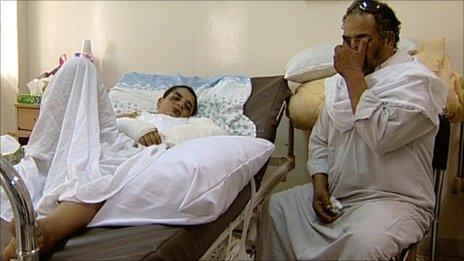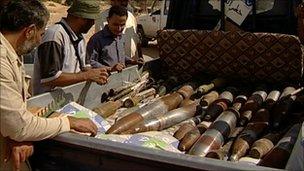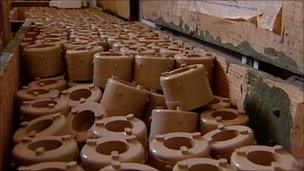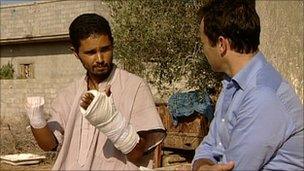Libya uprising: Deadly legacy of Gaddafi landmines
- Published

Abdulfatah has not yet been told about his brother's death by his father Ibrahim
Dozens of civilians, including many children, have been killed or injured in recent weeks in Libya by landmines planted by Col Muammar Gaddafi's forces and unexploded munitions they left behind.
The BBC's Damian Grammaticas reports from Zlitan, where more than one person a day has been hurt or killed by mines and bombs in the past four weeks but where there are no trained de-mining teams.
His face scorched and scarred, 13-year-old Abdulfatah Hazaz is lying in a hospital bed.
The boy's left arm is swathed in bandages, the bones shattered, his stomach peppered with shrapnel, his spleen ruptured.
Last week, Abdulfatah was fooling around with his brother outside their home. Now he is another casualty of Libya's fight for freedom.
"We were playing in the back yard. I was running and I jumped," remembers Abdulfatah. "Suddenly something exploded and I fell down. My brother fell too. I stood up. I ran to the house shouting and screaming and they brought me here."
His father Ibrahim sits by the bed trying to comfort him.
"I heard the explosion, I was inside the house" he tells me, "there was nothing but sound and smoke."
The boy's older brother, Zuhair, was killed instantly. But Abdulfatah has not yet been told Zuhair is dead.
"How could I tell him? He's between life and death at the moment," his father says. "I am afraid that if I tell him then maybe something will happen to him. He's asking about his brother all the time though."
Discarded ordnance
The hospital in Zlitan has seen 34 cases like Abdulfatah's in the last month - all civilians injured by landmines and unexploded bombs.
Two-thirds of the casualties have been children, and 12 died.

Local men have created a dump for all the unexploded munitions
The boys' family had fled their home in Dafniyah, just outside Zlitan, when it was occupied and used as a front-line position by Col Gaddafi's forces. The family only returned a couple of weeks ago.
The boys were playing by a shed when the accident happened last Friday. The ground is littered with spent 14.5mm anti-aircraft shells, pieces of rocket-propelled grenades and ammunition boxes.
It seems Zuhair picked up a shell that had not gone off. It exploded in his hand. The mangled metal case is all that is left.
Down by the seashore, local men have created a dump for all the unexploded munitions in a hole in the sand dunes.
These are not trained de-miners but fathers trying to protect their families from the dangers. They have no idea now to handle the bombs.
In pick-up trucks they come bouncing along the rocky tracks, giant unexploded shells rattling in the backs of their vehicles.
They lay them next to all the other discarded ordnance they have found, some of them live. There are huge artillery shells, mortar rounds, flares, rockets, even an unexploded grenade with the pin already pulled out.
Volunteer
Helping them is Anwar Ali Mohammed. He was a soldier on the Gaddafi side.

Some 50,000 mines and other devices have been dug up so far
He says he was brought here to help plant mines in the area but ran away when he saw what was happening.
"Gaddafi's son, Khamis, gave the order for myself and other soldiers to come here to show people how to lay landmines. They were trying to block the road to the rebels and destroy the country at the same time," says Anwar.
"They forced us to lay the landmines but we refused because we thought they were forbidden and they caused damage to civilians. The Khamis battalion was doing vicious stuff and then wanted us to show them how to lay the mines properly.
"I've now volunteered to show people what I saw and where the mines have been placed," Anwar adds.
Landmines were seeded throughout Dafniyah. They're one of Col Gaddafi's legacies to his people.
The area was the forward line of defence for Col Gaddafi's forces protecting Tripoli from any rebel advance.
A line of mines several kilometres long was laid stretching far inland. Signs mark where mines have been uncovered.
In one spot a child's bicycle lies on the ground in the middle of the minefield.
Plea for help
Ramadan Mahabrash fled during the fighting. When he returned home he found a plastic object under his olive trees. It was a detonator for a landmine.

Ramadan says he has no idea how he will be able to earn a living
His right arm now ends in a stump, wrapped in bandages, seeping yellow: his hand blown off. His left arm is bandaged too, his little finger missing.
"I was going to hand it to the military office so I picked it up. I didn't realise it was so dangerous," he says. "This was the first time I had seen it in my life. Then it exploded."
Before the conflict he was a car mechanic, now he has no idea how he will earn a living.
In a warehouse nearby, Salem Najar, spokesman for Zlitan's military council, shows us a room packed with the mines they have dug up so far: 50,000 small, pale plastic devices.
The detonators are in boxes nearby. It's highly dangerous as they could still trigger the mines.
The men doing the work are civilians using sticks and farming tools. Sometimes they say they usher sheep into the fields to try to check if there are mines laid there.
Salem says they urgently need help from professional de-miners.
"We have no experience in what we are doing, we're just using garden rakes. All the methods we know are for metal mines, but for plastic ones we have nothing."
Back in the hospital, the doctors say Abdulfatah should survive.
His father rubs his eyes, tears welling up.
He has lost one son, and cannot comprehend why his older son had to die, why Col Gaddafi's men left such dangerous weapons strewn around where civilians would find them.
"What can I say? Just for killing humans. It would make sense if it was a war between two countries, but we were just in our home," Ibrahim says.